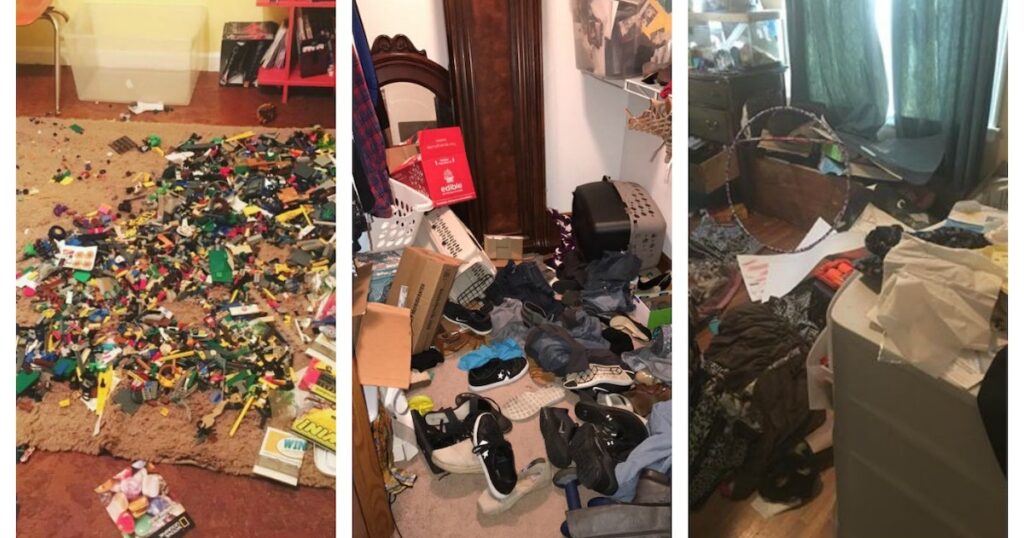Well, dear readers, buckle up because we’re about to take you on a wild and hilarious ride through the world of messy houses. In this article, we’ll explore the different levels of messiness that can turn your humble abode into a chaotic jungle. From the slightly disorganized to the “I can’t even find the remote” kind of mess, we’ve got it all covered. So, get ready to laugh, cringe, and maybe even find some inspiration to clean up your own mess. Trust us, you won’t want to miss this one!

This image is property of www.capitalhire.com.au.
Definition of a Messy House
A messy house can be defined as a living space that is cluttered, disorganized, and lacking cleanliness. It is a place where chaos reigns supreme, where piles of belongings are left unsorted, trash bins overflow, and surfaces are neglected and untidy. A messy house is characterized by excessive amounts of dust, dirt, unpleasant odors, and stubborn stains. It is a place that fails to provide a sense of calm, comfort, and order.
Signs of a Messy House
Piles of Unsorted Belongings
One of the most obvious signs of a messy house is the presence of piles of unsorted belongings. These piles are often scattered throughout the living space, taking up precious floor space and resulting in a cramped and cluttered environment. Whether it’s a stack of old magazines, a mountain of clothes waiting to be sorted, or a collection of random objects that have accumulated over time, these piles are a clear indication of a lack of organization and proper storage.
Overflowing Trash and Recycling Bins
Another telltale sign of a messy house is the sight of overflowing trash and recycling bins. Rather than being emptied regularly, these bins become a dumping ground for all kinds of waste, ranging from food scraps to discarded packaging. The sight and smell of overflowing trash not only contribute to a messy and unclean living environment but also attract unwanted pests and vermin.
Neglected and Untidy Surfaces
Neglected and untidy surfaces are yet another indication of a messy house. Countertops, tables, and shelves become cluttered with various items, such as books, papers, dishes, and personal belongings, that have been left out and not put away properly. These surfaces become magnets for more clutter, creating a cycle of messiness that seems never-ending.
Impact of a Messy House
Negative Effects on Mental Health
Living in a messy house can have a significant impact on mental health. The constant visual reminder of disarray and clutter can lead to feelings of overwhelm, stress, and anxiety. It becomes difficult to relax and unwind in a space where chaos reigns supreme. The state of the house can weigh heavily on the mind, causing a constant sense of unease and discontent.
Increased Stress and Anxiety
The messiness of the house can also contribute to increased levels of stress and anxiety. From the never-ending task of trying to find important items amidst the clutter to the constant worry about what others may think of the mess, living in a messy house can be incredibly draining both mentally and emotionally. The stress of constantly feeling behind in cleaning and organizing tasks can become a heavy burden to bear.
Impaired Focus and Productivity
A messy house can greatly impair focus and productivity. When surrounded by clutter and disarray, it becomes challenging to concentrate on tasks at hand. The constant distractions and the need to navigate through clutter to find necessary items can waste valuable time and energy. This can be particularly problematic when trying to work or study from home, as the messy environment can hinder productivity even further.
Health Risks Associated with a Messy House
Allergens and Respiratory Issues
A messy house can be a breeding ground for allergens and lead to respiratory issues. Dust, pet dander, and mold spores can accumulate in the piles of clutter, exacerbating allergies and asthma. Breathing in these allergens regularly can trigger sneezing, coughing, itching, and difficulty breathing. The presence of excessive dust and dirt can also contribute to poor indoor air quality, which can have long-term effects on respiratory health.
Pests and Vermin Infestation
Neglected and messy living spaces attract pests and vermin. Crumbs, food wrappers, and overflowing trash bins become an open invitation for rodents, insects, and other unwanted guests. These pests not only cause damage to property but also pose health risks through the spread of diseases and contamination of food. Dealing with a pest infestation can be a costly and time-consuming endeavor, further adding to the stress and frustration of living in a messy house.
Spread of Bacteria and Disease
A messy house can become a breeding ground for bacteria and the spread of disease. Surfaces that are not regularly cleaned and disinfected can harbor harmful germs and bacteria, increasing the risk of illness for those living in the house. From kitchen countertops to bathroom fixtures, neglecting cleanliness can have serious consequences for overall health and well-being.

This image is property of thissimplifiedhome.com.
Causes of a Messy House
Lack of Time for Cleaning and Organizing
One of the primary causes of a messy house is a lack of time for cleaning and organizing. In today’s fast-paced and busy world, many of us find ourselves juggling multiple responsibilities and commitments. It can be challenging to find the time to devote to household chores, and as a result, clutter and disarray slowly start to take over.
Hoarding Tendencies
Hoarding tendencies can also contribute to a messy house. For some individuals, the act of letting go of possessions can be an incredibly difficult task. They may form emotional attachments to their belongings, resulting in an overwhelming accumulation of items that go untouched and unsorted. Hoarding can quickly lead to a cluttered and unmanageable living environment if not addressed.
Disorganization and Procrastination
Disorganization and procrastination are common culprits when it comes to a messy house. Without a proper system in place for cleaning, organizing, and decluttering, it becomes easy to let things pile up and spiral out of control. Procrastination also plays a role, as tasks that could have been tackled earlier are put off, contributing to the endless cycle of messiness.
Consequences of Ignoring a Messy House
Decline in Overall Quality of Life
Ignoring a messy house can lead to a decline in the overall quality of life. Living in a disorganized and cluttered environment can negatively impact mood, productivity, and well-being. It can be difficult to fully enjoy and appreciate the space when constant messiness looms around every corner. A messy house can make it challenging to relax, entertain guests, and fully engage in activities that bring joy and satisfaction.
Strained Relationships with Others
A messy house can strain relationships with others. Whether it’s living with family members, roommates, or hosting guests, a messy house can create tension and frustration. It can lead to arguments, resentment, and a breakdown in communication. It is challenging to maintain harmonious relationships when the physical environment is constantly causing stress and discomfort.
Decreased Property Value
Another consequence of ignoring a messy house is a decreased property value. When it comes time to sell or rent the house, potential buyers or tenants are likely to be turned off by a cluttered and unclean living space. A messy house can give the impression of neglect and a lack of proper maintenance, leading to a lower perceived value of the property.

This image is property of imgix.bustle.com.
Strategies for Tackling a Messy House
Creating a Cleaning and Organization Plan
To tackle a messy house, it’s crucial to create a cleaning and organization plan. This involves setting aside dedicated time for cleaning and decluttering tasks and breaking them down into manageable chunks. By creating a schedule and allocating specific tasks to specific days, it becomes easier to stay on top of cleaning and prevent the mess from piling up.
Breaking Tasks into Manageable Chunks
Breaking tasks into manageable chunks is essential when tackling a messy house. Trying to tackle everything at once can quickly become overwhelming and discouraging. Instead, focus on one area or one specific task at a time. This could involve decluttering a single room, organizing a closet, or even just tackling one messy surface. By taking small, consistent steps, progress can be made without feeling overwhelmed.
Seeking Professional Help if Needed
In some cases, it may be necessary to seek professional help when dealing with a messy house. Professional organizers, cleaners, or even therapists can provide guidance and support in creating organization systems, tackling deep cleaning, and addressing the emotional aspects of clutter and messiness. Sometimes, an outside perspective and expertise can make all the difference in transforming a messy house into a clean and inviting home.
Importance of Regular Maintenance
Preventing Accumulation of Clutter
Regular maintenance is crucial in preventing the accumulation of clutter. By consistently tidying up, organizing, and decluttering, it becomes easier to stay on top of messiness. Regular maintenance ensures that items are put away properly, surfaces are cleaned regularly, and clutter does not have a chance to build up. A little effort each day can go a long way in maintaining a clean and organized living space.
Developing Good Cleaning Habits
Regular maintenance also helps in developing good cleaning habits. By consistently dedicating time to cleaning tasks, they become ingrained in one’s routine and no longer feel like a burden. When cleaning becomes a habit, it becomes easier to maintain cleanliness and prevent the house from spiraling into disarray.
Maintaining a Healthy and Pleasant Living Environment
Ultimately, regular maintenance is vital in maintaining a healthy and pleasant living environment. A clean and tidy house not only contributes to physical well-being but also enhances mental and emotional well-being. It creates a sense of calm, comfort, and order, providing a space where individuals can relax, unwind, and thrive.

This image is property of i0.wp.com.
Tips for Maintaining a Clean and Tidy House
Implementing Daily Cleaning Routines
Implementing daily cleaning routines is crucial for maintaining a clean and tidy house. This could include tasks such as making the bed, doing the dishes, sweeping the floors, and wiping down surfaces. By incorporating these tasks into a daily routine, the messiness can be kept at bay and prevent it from accumulating over time.
Designating Storage Spaces for Belongings
Designating storage spaces for belongings is essential in maintaining a tidy house. Each item should have a designated place where it belongs so that it can be easily put away after use. By providing ample storage solutions such as shelves, cabinets, and bins, it becomes easier to keep belongings organized and prevent them from adding to the clutter.
Involving the Entire Household in Cleaning Efforts
Maintaining a clean and tidy house should not fall solely on one person’s shoulders. Involving the entire household in cleaning efforts can help distribute the workload and create a sense of shared responsibility. By assigning age-appropriate tasks to family members, everyone can contribute to maintaining cleanliness and organization in the house.
Conclusion
Maintaining a clean and organized house is essential for overall well-being and quality of life. A messy house not only leads to physical health risks but also negatively impacts mental health and relationships. By understanding the causes and consequences of a messy house, implementing strategies, and regularly maintaining cleanliness, one can create a healthy, comfortable, and inviting home environment. So let’s banish the mess and embrace the joy of a clean and tidy house.
This image is property of qph.cf2.quoracdn.net.

